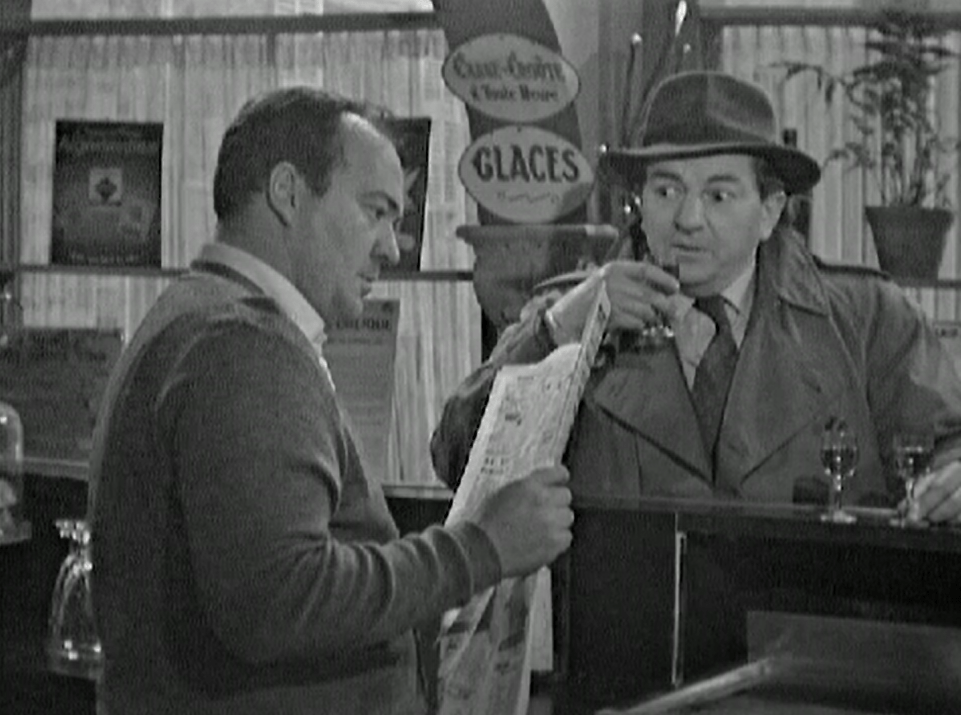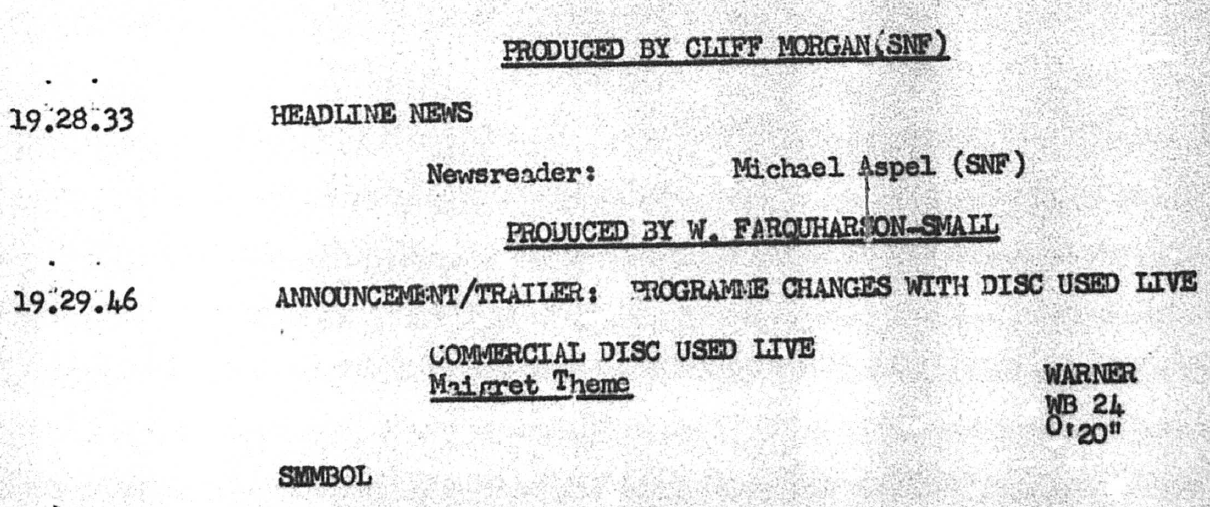SPOILER ALERT and – I guess – ADVERTISEMENT FEATURE: The following text gives away the conclusion to a television show that nobody’s seen in almost 60 years… but which you might well want to enjoy if you’re treating yourself to a rather nice new Blu-ray set.
“I thought there were fifty-one episodes of Maigret plus the pilot with someone other than Rupert Davies. So are there actually fifty-two, or does this shiny new set include said Davies-less pilot (which I thought was lost)?”
This was an e-mail that I received from Gary Russell within minutes of Network Distributing announcing their Blu-ray release of Maigret (1960-1963), the acclaimed BBC tv adaptations of Georges Simenon’s world-famous police detective novels which took the Corporation into the one-hour drama series arena and were seen to set new standards of broadcasting at the time. And you can see why. Maigret – as created by Simenon – is a fascinating character with his own sense of justice and his desire to understand the people involved in the crime that he is investigating. The casting of Rupert Davies as Maigret delighted Simenon, and you can see why in the programmes – in addition to which the location shooting in France is massively lavish for the time, the technical standards deeply impressive, the rich music scores from Ron Grainer are captivating, and you have sumptuous direction from legends like Rudolph Cartier to pull it all together into an exquisite package.
But, sadly, these programmes have spent decades in one of the murkier corners of Rights Hell with a mere four repeats on the BBC since 1969.
Naturally, Gary’s excited about this news because a) he has a fascination with important archival television and b) Rupert Davies was the first celebrity that he ever met. Gary and I know each other because about 30 years ago he was working in his professional capacity as an editor on a magazine to which I was a contributor – I’d known of him around 15 years prior to that because, in his professional capacity as an actor, he’d been one of the stars of Southern Television’s Enid Blyton’s Famous Five (1978-1979). And he was a brilliant editor – somebody who got excited about new ideas and would always find a way to Make Things Happen. But beyond the day job, Gary is also one of those amazing people who – when life collapses – will always pick up the phone to give you the encouragement and stamina to help you assemble the shattered fragments of the past into a new future. And since being a professional magazine editor, he’s been a professional audio drama producer, a professional television script editor, and his current role in life is as a professional animation producer. That’s an amazing professional career.
And talking of people who Make Things Happen, Gary shares this trait with the team at Network Distributing. The window of opportunity to research Maigret as it emerged from the darkness of the archives after over half a century was a narrow one, and – as circumstance would have it – coincided with the terrible global situation of the COVID pandemic. My wife and I had sampled a few episodes of Maigret in recent years at events such as those staged by Kaleidoscope and massively enjoyed them – but having to research viewing notes without leaving the house was a daunting challenge. At one juncture, we really felt that we’d be unable to deliver what the Network team needed. But, no, Network discussed the options and looked at the resources available and rethought the situation. So they were able to Make Things Happen.
Which is why over the years you love working with people such as Gary and Network.
But, back to Gary’s e-mail…
I’m not entirely sure which obscure backstreet of the internet Gary had been Googling or which dusty TV tome he’d got off the shelf to come up with his erroneous statistic, but I am pretty sure how the reference in question had offered him an integer one less than the true Maigret count. And let’s just clarify here: Basil Sydney starred as Maigret in the live presentation of Maigret and the Lost Life as part of BBC tv’s Sunday Night-Theatre in 1959, Rupert Davies then starred as Maigret in four runs of Maigret each of which comprised thirteen editions from 1960 to 1963, and then Rupert returned as Maigret in a one-off Play of the Month – Maigret at Bay – aired in 1969. The forthcoming Network set presents all the existing material: i.e. the 52 episodes and the 1969 play.
And it seems awful to say that the reason for the count being one out was the Radio Times because that sounds like it’s being blamed for something… but the magazine, which at the time was the BBC listings magazine, was just doing its job. And doing it very well indeed.
The discrepancy occurs during the third run of the series. Go and look at the BBC tv schedule in Radio Times for Maigret on Monday 10 December 1962.
Yes – you can. I know that most of the reference libraries are still very limited access with restricted opening hours, but, no, really, you can. Because there’s Genome, a BBC website with all the Corporation’s listings information from 1923 to 2009. One of the first things that m’colleague Hannah Cooper ever said to me was: “The BBC’s Genome website is one of the best things to have come into existence.” And when somebody massively younger than you says this to you, you know that this is the kind of person that you can work with…
Although, actually, since I wrote that last paragraph and you’ve read it, it’s not called Genome any more. Genome has now been subsumed by the BBC Programme Index. It’s still basically the same thing, but now goes up to the present day. However, over the next few paragraphs you’ll still find me calling it Genome because I really can’t be bothered to rewrite the rest of the text. Sorry.
Okay, so, you’ve looked up Monday 10 December 1962? Now go and look up Monday 17 December 1962. No, I’m not going to give you an easy link. Go on, give it a go – learn to use Genome yourself.
Right, so, now you’ve seen the problem. Both entries are for the episode The Amateurs aren’t they? Clearly, The Amateurs was due to air on Monday 10, but for some reason got bumped to Monday 17. Quite right – because the Radio Times is a lovely Document of Intent that arrives to brighten your life every Tuesday with a schedule for what should be on next week. I suspect that issuing a revised edition of each issue a fortnight later with the listings corrected to what actually aired would be an uneconomic venture. And, for me, the Radio Times is as much part of life as oxygen and gravity, so I’m very happy for it to continue as an economic venture.
Now, even back in 1982 after I’d been captivated by both my first non-Maigret Maigret (Seven Little Crosses) and my first Maigret Maigret (The Fontenay Murders), I was hungry to learn more about Le Patron. So, having located a library in the frozen tundra of the North with a comprehensive run of Radio Times, me, my pad of paper and my pen ambled over in the pre-Genome days and soon located the broadcasts. But even after logging the third run, my sixth sense (bestowed upon me by an unknown race of people in a lost city in Tibet) were tingling. I’d only located twelve episodes – with The Amateurs twice. Yes the first two series had been thirteen a-piece. And in TV terms thirteen’s a magic number – like 26, 39, 52 or 65, or at different times in US network history 32 or 30 or 24. Was there another lost episode lurking in a dimension beyond the listings magazine?
Well – yes and no. Being a prestige production and a popular programme, Maigret was blessed with a repeat run about six months after its original broadcast. And if you check the Summer 1963 schedules, then you’ll find that on Saturday 21 September 1963, BBC tv airs The Trap (a really excellent episode by the way). And at the foot of the billing for The Trap in the Radio Times, the entry actually informs you: ‘First shown on December 10, 1962’. So, yes, the Document of Intent is also going beyond its call of duty here and also functioning as a Document of Record. Good old Radio Times!
And so 51 becomes 52.
What had happened was that The Amateurs was the final episode of the run to be made and was due to be recorded on Tuesday 4 December; it was intended to air as the penultimate edition of the run six days later on Monday 10 December, with The Trap – already telerecorded back in early October – then concluding the series on Monday 17 December. But recording on The Amateurs had to be deferred to Monday 10 December – the day of transmission – and so the show would not be ready in time for broadcast. The only option was to bring The Trap forward by a week, and bow out with The Amateurs seven days later after it had been safely committed to film.
So, an unlisted first broadcast – easy! But what about an unlisted repeat broadcast. Hmmm. That’s a bit trickier. My Maigret-style investigations via the Radio Times also embraced the Points from the Post correspondence section of the magazine, and in the edition of Thursday 26 July 1962 there was a missive from GP Sanctuary of Staines. ‘I have made an alarming and vitally significant discovery,’ he declared. A couple of weeks earlier, GP had stayed up late, tuned to BBC tv for the first live transatlantic television to be sent via Telstar. Earlier that evening he had watched the latest episode of the BBC’s ground-breaking police procedural Z Cars (1962-1965, 1967-1978). A few hours later, he had watched a repeat of Maigret and been aghast to discover that [SPOILER ALERT!] ‘the murderer in the latter programme was none other than Inspector Barlow of Z Cars […] I can only draw one conclusion from the evidence. Either Z Cars is harbouring a dangerous criminal in Barlow […] or, Maigret is under investigation by Barlow.’ The Radio Times editor confirmed that Z Cars star Stratford Johns had indeed played the villain in the Maigret repeat.
Only problem is that when you check the Radio Times listings for the night that Telstar went up – Tuesday 10 July – there’s no Maigret. There’s a Z Cars – Appearance in Court – at 7.55pm, but no sign of Le Patron. The schedule runs:
- 7.30pm: Compact: Comings and Goings
- 7.55pm: Z Cars: Appearance in Court
- 8.45pm: Brothers in Law: Counsel for the Prosecution
- 9.15pm: News
- 9.25pm: The Barriers Come Down
- 10.05pm: David Niven: A Film Profile
- 10.35pm: Brock Peters
- 10:50pm: Late Night News followed by The Weather and Close Down
And if you take a look from May to July 1962 on Genome, then you will find repeats of Maigret, but on Sunday afternoons. And only twelve of them…
The unlisted repeat is Murder on Monday – complete with Stratford Johns. So, to confirm what happened here, you contact the glorious research hub of the BBC Written Archive Centre and negotiate to acquire a copy of the programme-as-broadcast (PasB) document which should be the most accurate Document of Record available. These form a programme log of what actually aired on BBC tv and when it aired. And this reveals what really happened.
Even before Compact (1962-1965) went out, BBC tv knew that it was rearranging its late evening schedule to allow for the coverage of Telstar’s historic transmission. As such, the 35mm film of Murder on Monday – planned to end the repeat run of Maigret in early August – was accessed to bridge the evening gap, and an announcement about this schedule change was made at 7.29pm.
Following the news, the actual schedule on the night ran:
- 9.26pm: Project Telstar – Part 1
- 10.10pm: David Niven: A Film Profile
- 10.40pm: News followed by The Weather
- 10.44pm: Maigret: Murder on Monday
- 11.36pm: Project Telstar – Part 2
- 1.12am: Late Night News followed by The Weather and Close Down
And, in actual fact, the Radio Times acted as a Document of Record yet again. Check out the second repeat of Murder on Monday when it was proudly presented as an example of The Best of Maigret on Monday 9 March 1964. And there you’ll find at the foot of the billing: ‘Last shown on July 10, 1962’. Good old Radio Times! Again!
Now, for the sake of parity, I think I need to point out that – naturally – it wasn’t just the Radio Times that was prone to unscheduled show swaps. On Monday 19 November 1962, according to the commercial television listings magazine TV Times, the Maigret episode The Crooked Castle (another good one – in fact, there’s barely any bad ones in the whole run) was broadcast in the London area against the American Civil War drama The Americans (1961) which had moved from Fridays to Mondays and was scheduled to continue at 9.15pm that night with the episode The Invaders. But, according to the comments of Richard Sear in the Daily Mirror the following morning under the strapline ‘THIS clash is a real CRIME!’, what viewers forsaking Le Patron for Associated-Rediffusion had seen that evening was actually Requiem for a Sunday Afternoon, a very tense edition of the imported New York police procedural Naked City (1958-1963).
But that’s another story. Just one of eight million.
Andrew Pixley is a retired data developer. For the last 30 years he’s written about almost anything to do with television if people will pay him – and occasionally when they won’t. And – yes – this is a thinly disguised plug for the Blu-ray release of Maigret which, in case you still haven’t realised, he’ll just insert the hyperlink for pre-ordering again here to be really blatant about it. Look, he’s read CSTonline for long enough now. He knows that most of these blogs are just samples for major research projects or previously published papers that need to be bumped to get those extra citations. So, he’s just trying to blend in with the rest of you. Oh, and stay safe over the Summer won’t you? Even if you can’t get out on your barquentines as much as you’d like to.








Speaking of “Maigret” (which I can’t wait to finally be able to watch), am I the only one who thinks it unfair that the Ernie Quelle theme doesn’t seem to get any love at all. I do agree that Ron Grainer’s theme is more invetive and more atmospheric but that gentle, melodic waltz of Quelle’s is so hauntingly beautiful and memorable I find that it’s easily the tune I tend to whistle the most as I go about my business. Can’t wait to read all about it in your book (sorry, viewing notes).
Hello Mateja 🙂
Very much hope you enjoy the series when you get chance – my wife and I were absolutely knocked out at how good the BBC’s take on “Maigret” was when we got to see it. It has a quality that we seldom see in other shows of the period.
And – yes – I got to hear the Ernie Quelle music during my research and made reference to it in the notes. It’s rather brilliant isn’t it?
All the best
Andrew
Can you buy the Maigret book by Andrew Pixley separately ?
Hello Arthur 🙂
Thank you for your interest… but I’m afraid that the viewing notes were only a limited run and sold out effectively on publication. For most of these sets (there’s a few exceptions such as “Callan”, “Public Eye” and “The Goodies”), these volumes are only available in the de luxe boxes for particularly keen collectors – and they do tend to sell out rapidly to the enthusiasts who order first.
Very sorry if you’ve missed out on this occasion – but hope that you’re enjoying the series. That’s the main thing. It’s a rather wonderful piece of television isn’t it?
All the best
Andrew
Hello Andrew
Thank You for reply.
Am really enjoying Maigret !
Thanks Again
Arthur
Oh, that’s excellent news Arthur! It’s a terrific show isn’t it?
All the best
Andrew